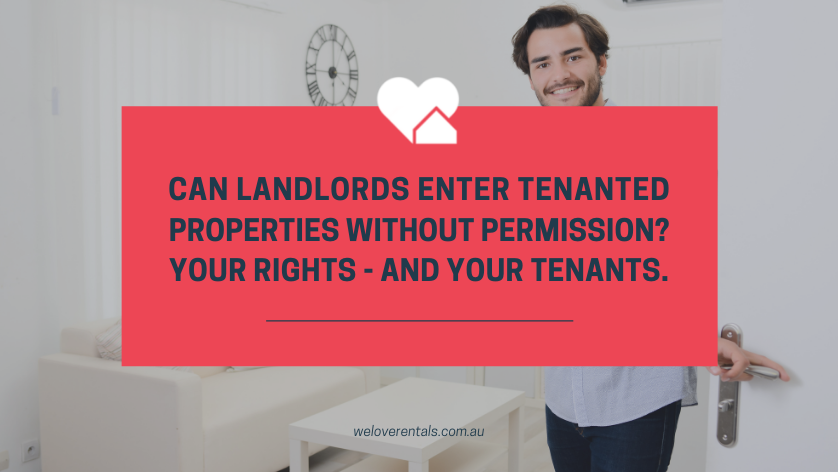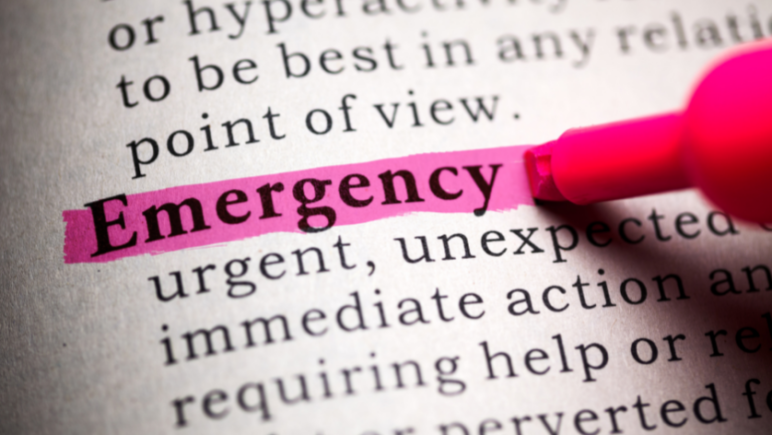
Rules About A Landlord Entering Property Without Permission
Unsure where you stand as a landlord entering property without permission? It can be tricky to understand and follow every legal requirement. There’s a lot to remember!
For example, requirements for when a landlord can enter a tenanted property are complex and vary, depending on the reason for entry.
When can landlords enter tenanted premises?
Reasons/circumstances where you may enter the premises include:
- rent collection
- routine inspection
- carrying out (or inspecting) repairs or maintenance
- emergencies
- abandoned property
- showing prospective tenants or buyers
- when tenants have given consent just prior to entry.
When entering a tenanted property, understanding what is “reasonable” is vital.
The Residential Tenancies Act (1987) (RTA) does not always define what’s reasonable – sometimes you need to negotiate. One of the many reasons to use a property management company is because they know the law. Click the following link for more benefits of using a property manager.
Book a Free Rental Appraisal Now
Landlord entry and access to tenanted rental properties
NOTE: “Entering” covers any time you (or your representatives) set foot on the property, even if you don’t enter the house.
Here are some more key points a landlord must know…
-
Emergencies
ENTRY WITHOUT CONSENT, WITHOUT NOTICE

An emergency is the only time a landlord can enter a tenanted property without the tenant’s consent or notice.
‘Emergency’ is not defined in the Residential Tenancies Act 1987 (RTA), so make sure entry is justifiable.
Only a significant actual or imminent threat to safety or the property is likely to qualify as an emergency.
For example:
- a natural disaster,
- a loss of essential services (like burst sewage or water pipes)
- safety risks (gas leaks, faulty pool enclosures, collapsing ceilings or electrical faults).
-
Collecting rent
A landlord can enter to collect rent no more than once per week, and only if pre-arranged in the lease. Impromptu rent collection in-person is prohibited.
-
Routine inspections
You (or your representative) may enter to inspect the property as a routine inspection up to four times a year.
ENTRY WITH CONSENT
Except in an emergency, a landlord must give notice before they enter the property. (Correct methods for giving notice can be found on the Commerce WA website.)
Tenants may grant you the right to enter the property when they are not present — but this does not mean you have the right to enter at any time.
If a mutually convenient time can’t be agreed upon, you may seek a court order to enter.
WHAT DOES THE RESIDENTIAL TENANCIES ACT SAY ABOUT WHEN A LANDLORD CAN ENTER THE PROPERTY?
When organising routine inspections:
- serve tenants a Form 19 Notice of Proposed Entry to Premises
- tenants must be given 7-14 days’ notice of entry,
- notices must specify the date of entry and whether it will be before/after noon,
- inspections must be at a reasonable hour (or an agreed time): reasonable hours include between 8am and 6pm weekdays or 9am to 5pm on Saturdays,
- if tenants advise the proposed time is inconvenient, make reasonable efforts to negotiate a suitable time.
INTERFERENCE WITH TENANT PRIVACY
Tenants are entitled to quiet enjoyment of the property.
If you enter the premises unannounced, even for something helpful like mowing, tenants may serve a breach notice.
Interference with tenant privacy can also include less obvious things like frequently driving past, then criticising the property’s condition.
You can only breach tenants after a formal inspection.
When you do inspect the rental, respect tenants’ privacy. We recommend only checking inside cupboards if:
- they are visibly damaged,
- they contain water pipes, electrical controls or alarms, or
- you suspect damage inside the cupboard (timber pests, damp, etc.)
Remember, you aren’t entitled to judge how tidy tenants’ belongings are. Routine inspections are only to check the property’s condition and that the lease is not being breached.
However, if tenants fail to keep the property “reasonably clean”, you may serve a breach notice and reinspect to ensure the problem is fixed.
-
Necessary repairs or maintenance

A landlord can enter the property to conduct necessary repairs or maintenance.
The RTA provides that tenants:
- receive at least 72 hours written notice of entry
- have the opportunity to be present while work is carried out
- can negotiate a new time if a proposed date/time is inconvenient.
A landlord must take full responsibility if tenant belongings are damaged during entry.
Tenants must not unreasonably delay repairs where this could cause further damage.
-
Showing property to prospective buyers or tenants
You (or your representatives) may enter to show the property to prospective tenants or buyers, with proper notice or by agreement with the tenant.
RENTAL HOME OPENS
You may enter to show the premises to prospective tenants:
- within the final 21 days of your current tenancy agreement
- if you gave your tenants reasonable notice in writing.
The RTA does not define “reasonable notice” for this type of entry, so try to reach a mutual agreement.
Consider your tenant’s circumstances, they may have a valid reason for suggesting an alternative home open time — if they’re a shift worker or housebound, they may require more notice than another tenant.
NOTE: Sometimes, it’s better not to show a property until it is vacant. Loss of rent may be offset by the property not looking its best when tenants are in the middle of packing, and you haven’t had a chance to spruce the property up!
Where tenants are uncooperative, you can go to the Magistrate’s Court to secure access. It is, however, best to reach a mutual agreement. Your property manager might suggest offering a slight rent reduction for the period when tenants are inconvenienced.
SALE HOME OPENS
You may show a tenanted property to prospective buyers after giving tenants reasonable notice in writing.
Again, “reasonable” is subjective — try to reach an agreement with tenants.
-
Abandoned property
ENTRY WITHOUT CONSENT, WITH NOTICE
If you have reasonable grounds to suspect your property has been abandoned (for example, rent is unpaid and the letterbox is overflowing), you must give written notice before entering. You can then exercise your right to enter without the tenant’s consent.
First:
- try to contact tenants (or their next of kin) by phone/email
- serve Form 12 – Notice to Tenant of Abandonment of Premises at the property and tenants’ workplace
- wait 24 hours for tenants’ response
- secure the property
- if tenants’ belongings remain, follow government guidelines
Your responsibilities as a landlord
We’ve covered a lot of ground here about a landlord entering property without permission – and there are even more detailed requirements in the RTA. You may feel overwhelmed.
To minimise risk, we recommend consulting an expert property manager before you enter tenanted property.
At We Love Rentals, our property managers manage rentals exclusively. They’re well-versed in tenancy law and manage a maximum of 80 properties each. They have the time and know-how to ensure compliance with entry requirements.
If you think we can help you manage your property and take a weight off your shoulders, we’d love to chat with you! Get in touch with Brendan, Janine or Sarah in our management team on (08) 6254 6300 or book an obligation free rental appraisal.

